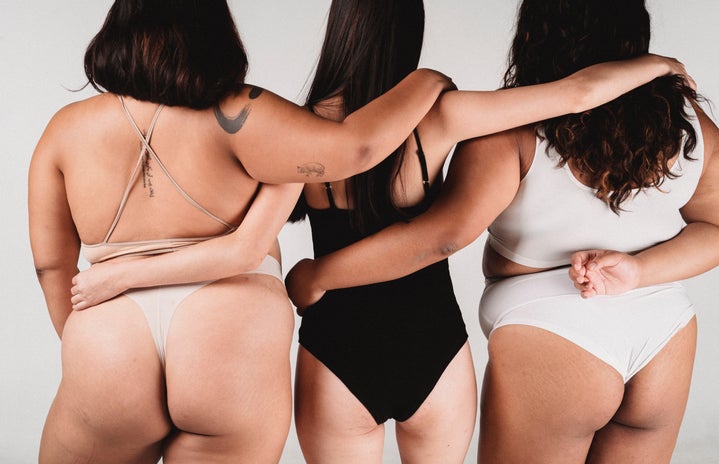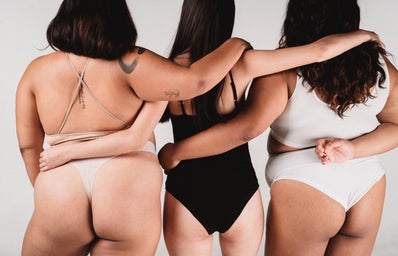For the past couple years, body-positive and acceptance movements have taken the world by storm. People have placed an increasing importance on accepting and loving your body unconditionally, regardless of how it looks. Ironically, body-positive movements were established to create an emphasis on accepting bodies of all races, of all disabilities, and of all shapes, yet fatphobia remains a prevalent stigma in society.
Fatphobia has a couple of definitions, but it is most commonly associated with a fear of becoming, being, or being perceived as fat. However, fatphobia is much broader than this. It refers to the general negative connotations and associations that people have in relation to fatness. For example: “No! You’re not fat. You’re pretty,” implies that the person making this statement associates fatness with being un-pretty. Fatphobia also includes the social stigmatisation of fat people (read: they don’t take care of themselves, they eat too much, they shouldn’t wear certain clothes), as well as the disadvantages that fat people face because they are fat, such as a limited number of stores that accommodate their sizes, as well as medical care solely focussed on their weight rather than addressing the actual problem. Fatphobia exists in many facets of our societal culture which perpetuates, though not very obviously, ideologies of fat being a negative thing. Therefore, it’s important to address and recognise fatphobia so we can destigmatise it and actually establish a world of body-neutrality.
An aspect of fat-activists or body-positive activists that people commonly assume is that these activists and movements are approving as well as promoting unhealthy lifestyles and morbid obesity. Again, it’s important to note how the claims against these movements are associated with negative connotations of fatness (i.e. being unhealthy and living a poor lifestyle), re-iterating the fatphobic ideas that are ingrained in society. However, these movements are in no way promoting unhealthy lifestyles, nor obesity. Instead, these movements are aimed at appreciating one’s body instead of constantly putting it down and hating it. A common misconception of fat people is that they don’t exercise nor eat healthily. However, many people have debunked this because there are fat people who consistently eat well and exercise regularly, yet are still fat. Celebrities like Lizzo have often discussed this publicly and even shown their workouts and meals, yet people still call them out for “promoting obesity”.
The most noticeable way that society perpetuates fatphobia is through the fashion industry. Simply put, the fashion industry has not made enough space for fat people. The fashion industry seems to have this belief that fat people should wear baggy and ill-fitting clothing. The clothing made for fat people often consists of loose and long sleeves. They are rarely made to be tight or cropped, and shorts or short skirts for bigger sizes are hard to come by. The problem with clothes for bigger people being made to cover their bodies is that it can lead to conditioning fat people into being ashamed of their figures, as well as thinking it does constantly need to be covered. Fashion for fat people, though perhaps not consciously, maintains the idea that fat people shouldn’t (and perhaps even can’t) wear trendy and revealing clothing.
Specifically in a South African context, finding affordable and fashionable plus-sized clothing is often on the impossible end of things. Surprisingly, despite a large proportion of South Africa’s population being sized 16 or above, it simply hasn’t met the mark for a plus-size friendly fashion industry. Yes, there are clothing brands like ‘Donna’ (which now falls under ‘Foschini’) that are specifically aimed at fat people. However, the clothing in ‘Donna’ is aimed at fat people who want to wear modest clothing, and generally stocks clothing aimed at older people. For young, fat people, ‘Donna’ doesn’t necessarily equal trendy or appealing clothing. And yes, Mr Price and Cotton On do have plus sized ranges, but they are either modest or not affordable. There are also other smaller businesses that make clothing for plus-sized people, however, these tend to be less budget friendly.
On top of this, for fat fem bodies, there isn’t a great variety of affordable (and appealing) lingerie, especially if you’re not an “ideal” fat person who doesn’t have a large chest. The problem with not making plus-sized lingerie that isn’t modest, plain, and aimed at shaping and disguising the fat, is that it conveys the message that appealing lingerie isn’t something that fat people should be wearing, nor something that they should be interested in wearing.
An important aspect to take note of in terms of the fashion industry, is that fact that your every-day brands that do have plus-sized ranges have these ranges that are completely different from the clothes for “normal” sized people. What I mean by this is that they don’t take the clothing already in their stores and make them available in bigger sizes. Instead, they make a separate range for plus-sized. This isn’t necessarily fatphobic, but it is frustrating because this limits the clothing available to fat people, and creates an “othering” of plus-sized clothing. Fat people want to be able to wear the same sort of clothing that those in “normal” and “acceptable” bodies do, but are never given the opportunity to do so.
Accessibility is also a necessary discussion to have regarding plus-sized ranges. Brands that do have fat-friendly ranges don’t always stock them in every store. Naturally, this limits the shops that fat people can shop in. A take away from this is to recognise that asking your fat friends to go shopping isn’t always fun or productive for them, as most of the shops don’t stock clothes for them. (I’m not saying you’re not allowed to go shopping in stores that don’t stock plus-sized ranges; I’m just saying be mindful that your fat friend may not be able to shop in some places.)
So why is this necessary? Why do we need to discuss fatphobia?
Well, it’s necessary because fatphobia exists in subtle nuances that people aren’t necessarily conscious of. So, by discussing fatphobia, people can recognise some behaviours or sayings that may be fatphobic, and by recognising these they are (hopefully) able to change them. Fatphobia is ingrained in society and regardless of how much we try creating and pushing body-positive movements (which is another discussion in and of itself), the world has simply not been able to destroy its fatphobic stigmas. We need to dismantle fatphobia so that fat people don’t have to work so hard to unlearn their internalised fatphobia, and so that they don’t have to push themselves so hard to feel comfortable and confident in clothing typically deemed “un-suitable” for fat people. Most importantly, we need to dismantle fatphobia so that we can work towards removing toxic and unhealthy diet cultures that perpetuate fatphobia ideologies.
This is just your friendly reminder to reflect on your associations with fatness, as well as your reminder that fat people don’t owe you skinniness nor modesty. To all my fat friends, please don’t let society stop you from living your best life just because you’re fat.


